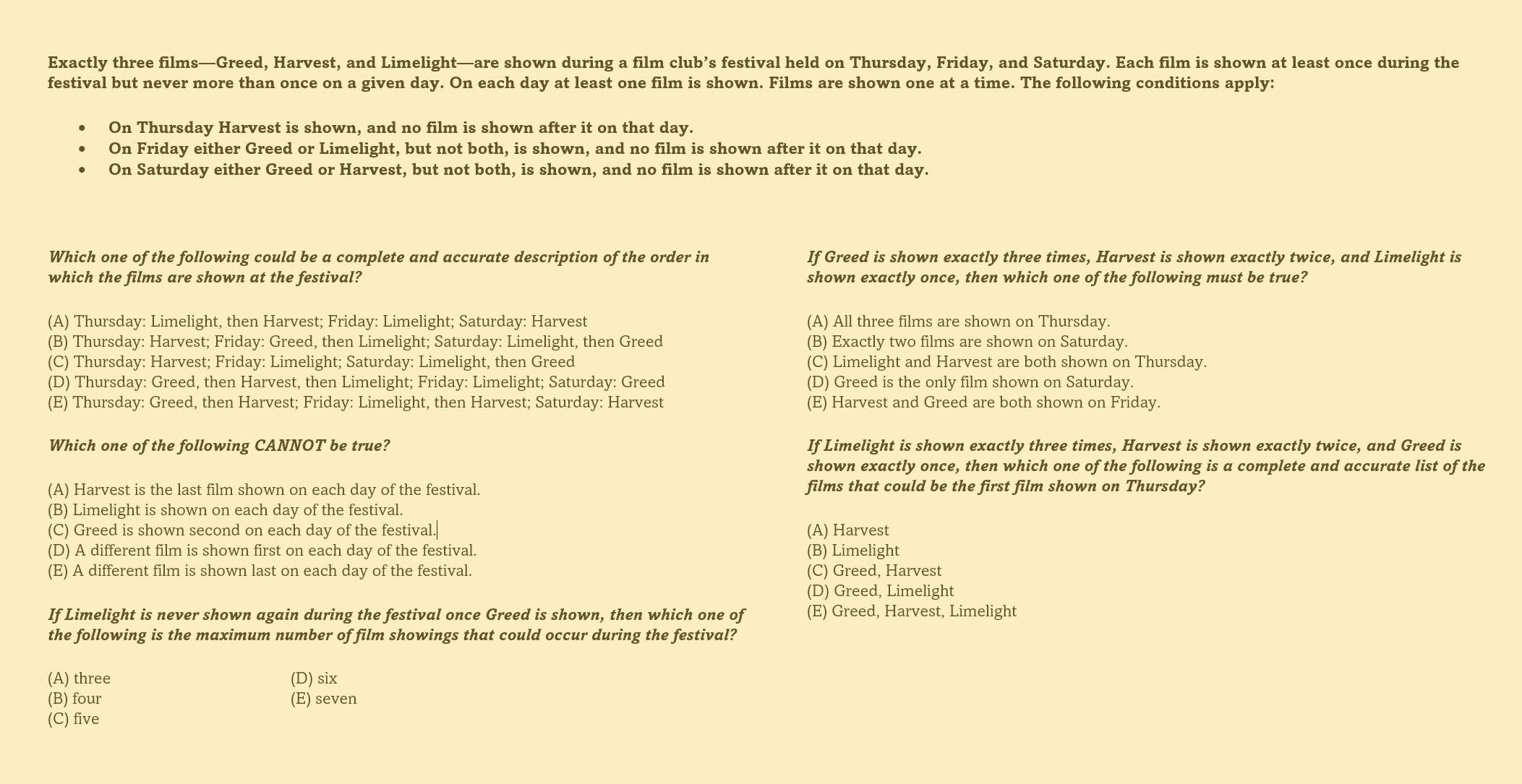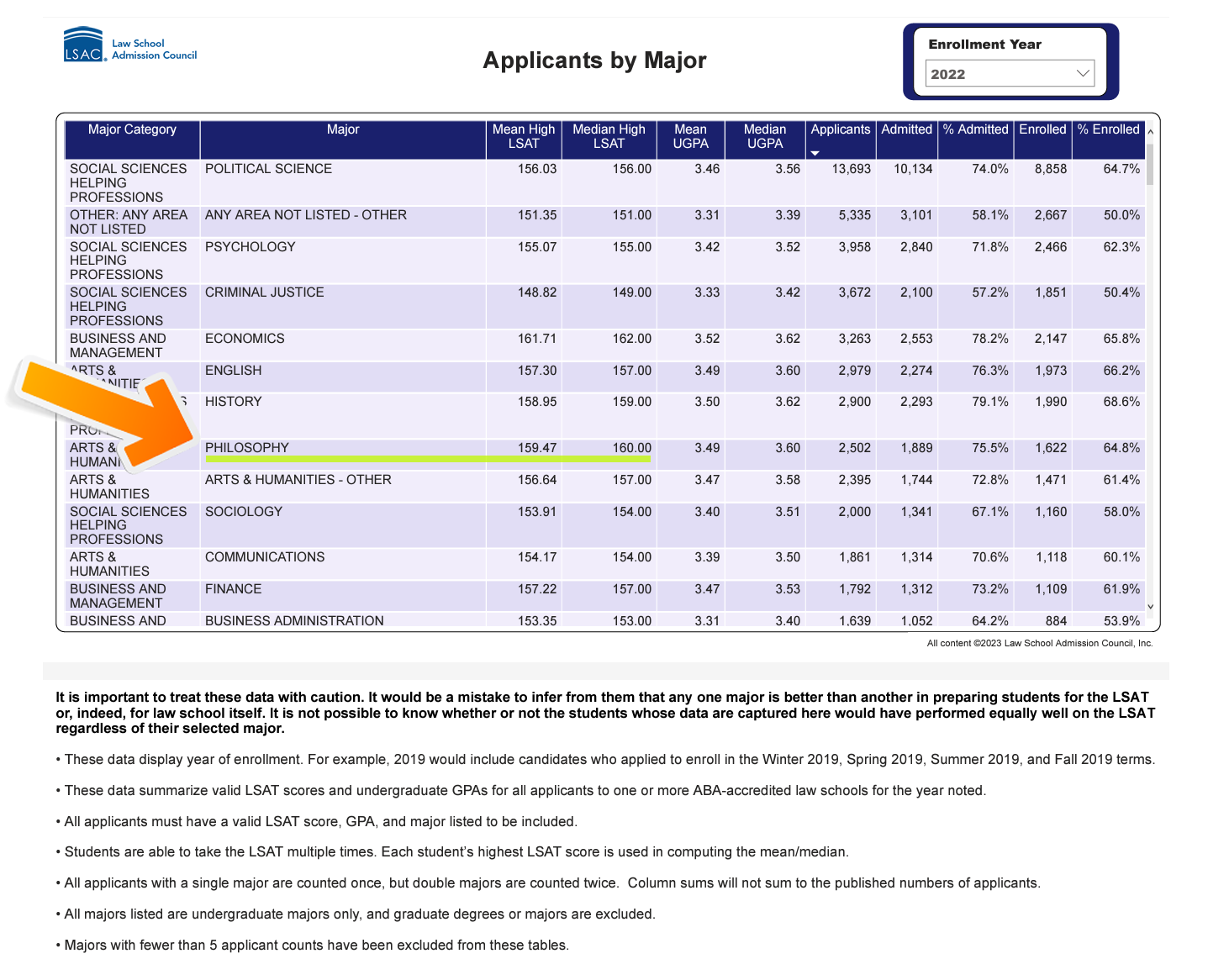LSAT Drops “Logic Games” Section
Next year’s version of the Law School Admissions Test will not include the notoriously difficult “logic games” section.
This section is full of questions that look like this:

[sample LSAT question from “The LSAT Trainer”]
The elimination of logic games comes after the LSAC [Law School Admissions Council] entered into a 2019 settlement with two blind LSAT takers who claimed the logic games violated the Americans With Disabilities Act because they could not draw the diagrams often used to complete that portion of the test. The council had four years to replace the logic games with a new analytical reasoning section under the settlement. Because the analytical and logical reasoning sections test the same skills, it made sense to drop analytical reasoning altogether, council president Kellye Testy said in an interview Wednesday.
The replacement of the games section with a new analytical reasoning section “had ‘virtually no impact on overall scoring’ based on a review of more than 218,000 exams”.
That philosophy majors tend to do well on the LSAT is sometimes touted as one reason prospective law students should study philosophy…

…despite the standard “correlation ≠ causation” disclaimers (though do see this). Whether the replacement of the logic games section will affect how philosophy majors perform on the test remains to be seen.


It is an interesting question whether the obstacles are surmountable… I once taught (rudimentary) argument diagrams to a student who could not see: https://philpapers.org/archive/CHATAD-11.pdf
If Ms. Testye is right that the LG and LR sections test the same skills, the LSAC could simply replace LG with LR for blind students and keep it for everyone else. Alternative explanation: LSAC wants to gerrymander the test apropos of their Diversity, Equity and Inclusion goals. Anyone else smell a rat?
So they arranged to get themselves sued in 2019 so they’d have a pretext to change the test in 2024 – to include an extra logical reasoning section in place of the logic games section – all as part of their nefarious DEI agenda? Talk about playing the long game!
lol
Arranged to get themselves sued? Perhaps not, though I’ll note that that part was your invention. “Providing a pretext” doesn’t seem to be going too far afield: really, I wouldn’t be surprised if a few of them were chomping at the bit. Can you think of a better explanation for completely dropping a part of the exam that a vanishingly small number of test takers are unable to attempt, especially if, as Ms. Testye notes, it’s supposedly “testing the same skills” as the section it’s being replaced by? Or for that matter, permanently dropping the fifth experimental section a few years during Covid and never putting it back despite a return to in-person testing? A brief glance at the bios of the top LSAC officials does much to arouse the suspicion that they probably don’t like the demographic trends their tests display and-by eliminating the exam’s ‘math’ section and reducing its time pressure-taking away elements that seem to favor groups whom they think ought to be knocked down a few pegs.
And as for the two sections “testing the same skills”, this one has his doubts. For as long as memory serves, they’ve been described in entirely different terms on the LSAC website:
Analytical Reasoning (AR) questions are designed to assess your ability to consider a group of facts and rules, and, given those facts and rules, determine what could or must be true.
The LSAT’s Logical Reasoning questions are designed to evaluate your ability to examine, analyze, and critically evaluate arguments as they occur in ordinary language.
Seems more than a little too good to be true, claiming that those skills sets are one and the “same”, but then again I’m not the one who has to make up an excuse.
Nah. I am with Derek. They were playing the long game. Never believe the official explanation, no coincidences, Occam-can-kiss-my-tinfoil hat. Woohoo!
But the “official explanation” doesn’t even agree with itself-see above. How can one make the seemingly unjustifiable claim that the acts of “critically evaluating arguments as they occur in ordinary language” and “determining what could or may be true” given a set of “facts and rules” are just the same as one another and still sleep at night? For that matter, why not replace the Reading Comprehension section with LR as well: reading that is “exacting, distinguishing precisely what is said from what is not said” seems to have a lot more with “critically evaluating language” than the nonverbal Logic Games do. While I also found Derek’s straw man amusing, it felt a little unprofessional as well, coming from a philosopher.
Moreover, Occam doesn’t seem like the right reference: Completely replacing an entire section with another one that doesn’t test the same skills in order to accommodate a small number of exam takers rather than developing a targeted approach would appear to be the most cumbersome, convoluted solution possible in this case.
OK, Vlad3399. Time to take a break.
Justin, I hope you’re not suggesting it’s time to censor the site when someone makes a suggestion you don’t agree with?
You must be new. OK. People don’t get censored here for disagreeing with me. But they may have their comments deleted or commenting ability blocked if they can’t behave (and they’re especially at risk of that if they’re using a pseudonym). And no, we won’t be having a conversation about what “can’t behave” means—I have too many other things to—though interpreting my suggestion that you take a break as censoring you because I don’t agree with you is a good example.
What? I thought I heard someone mention me 😉
Au contraire mon ami. Occam is the man here. Let’s see: 1) Official explanation: they got sued, lost, and ordered to comply, which they found to be too much trouble/money/bother, and given that it made no difference (their claim), they dropped the part. This is all empirically verifiable, and even if you disagree with their “no difference” claim, the official explanation is persuasive. 2) Alternative Explanation: It’s a DEI plot!!! They just needed an excuse to implement The Great (LSAT) Reset. All of which is (a) not falsifiable unless you tell me what would prove it false for you, (b) and supported by your intuition that something is fishy, which you back with your “look who is on the board” (What does that mean? Race? Gender? Ideology? Else?) claim/argument, plus arguments/claims a, b, c…z, ALL of which have to be true or else the whole thing crumbles. I told you, bro. Occam is the man.
It will be interesting to see whether this change results in any effect on the present correlation between exam scores and performance in law school. I can’t begin to predict but I will say the capacity to perform complex reasoning functions under time pressure is essential for being a good attorney.
“the capacity to perform complex reasoning functions under time pressure is essential for being a good attorney.”
Is it, really? I have doubts.
I guess it depends what sort of attorney one becomes, but for a typical litigator, definitely. They have to recognize and evaluate arguments (better and worse) quickly and figure out how to respond, sometimes in a rapid verbal exchange. Or they might be writing similar things under time pressure, needing to anticipate and incorporate complicated concepts in the effort. The LSAT isn’t some perfect test of this but it measured something useful imo, and the games were useful in that effort. People with relevant disabilities have accomplished it successfully before, so I’m not sure why they couldn’t adapt for this rather than canceling the whole section.
Yeah, I can see how the ability to work under “time pressure,” the *specific kind* of which standardized testing involves, can certainly help one practice effectively. But I think you way overstate the case by saying this ability is “essential” to being a good litigator. For example, some people may not have this ability, but they compensate for it with foresight, such that they don’t need to rely so much on an ability to think quickly because they’ve anticipated in advance the arguments the other side will make. This is just one example of my point. And I also think that the type of time pressure lawyers usually face is not the same kind of time pressure involved in taking the LSAT.